
Comic Book Historians
As featured on LEGO.com, Marvel.com, Slugfest, NPR, Wall Street Journal and the Today Show, host & series producer Alex Grand, author of the best seller, Understanding Superhero Comic Books (with various co-hosts Bill Field, David Armstrong, N. Scott Robinson, Ph.D., Jim Thompson) and guests engage in a Journalistic Comic Book Historical discussion between professionals, historians and scholars in determining what happened and when in comics, from strips and pulps to the platinum age comic book, through golden, silver, bronze and then toward modern
Support us at https://www.patreon.com/comicbookhistorians.
Read Alex Grand's Understanding Superhero Comic Books published by McFarland & Company here at: https://a.co/d/2PlsODN
Series directed, produced & edited by Alex Grand
All episodes ©Comic Book Historians LLC.
Comic Book Historians
Rick Marschall Career Interview, Strip Historian Part 2: 1978 Marvel Comics to Hogans Alley
Artsy Alex Grand, Jazzy Jim Thompson, and Bill Fantastic Field continue the Rick Marschall Interview starting when he first starts in Marvel Comics Magazines in 1978 and meets Jim Shooter for the first time, discussing his working with various comic book superstars of the time like Chris Claremont, Rudy Nebres, John Buscema, Dough Moench, Marv Wolfman and Len Wein, Tony DeZuniga, Don McGregor, Bob Larkin, Earl Norem, Frank Frazetta, Gil Kane, Marie Severin, John Severin, Stan Lee, Archie Goodwin, Howard the Duck and more. The circumstance of his Marvel departure in 1980 as he creates Epic Magazine, and his portion of the Jim Shooter purge of eliminating 70s Marvel talent from the bullpen is discussed, as well as his later assignments at Disney Comics, Nemo Magazine with Fantagraphics, Nemo Strip Reprints, Plotting the Thundercats cartoon, starting Hogan's Alley with Tom Heintjes, working with Milton Caniff, Dr. Seuss, and writing his many entries or books on comic history. There are so many sticks of butter you'll need for this one, it will make your head spin! Again, it's the cat's meow. Edited & Produced by Alex Grand. No Sense Remix - Standard License. Marvel Magazines ©Marvel Comics. Support us at https://www.patreon.com/comicbookhistorians
Podcast and Audio ©℗ 2019 Comic Book Historians
The following is his Marvel Comics interview segment with CBH:
Bill: Our listeners … have to hear about your move to Marvel in ’77 and your important work there. How did you end up at Marvel? And if it’s okay with you, I’ll just ask you to tell us about your entire career experience from the time you were hired until you left.
Rick Marschall: Yeah. I’m happy to do that, Bill, for two reasons. One is it’s part of this flow, but also because it’s not really out there. As a matter of fact, some mistakes are out there including in some … I don’t know if they’re blogs or columns or whatever. Jim Shooter has been writing his autobiography. It was for a while, episode by episode or whatever. Guys, now that I think of it, it’s sort of like a very tall American version of Maurice Horn. So many bridges burned behind him.
Rick Marschall: But I read once, and I don’t know whether it’s worth it to counter all this, but he said I was hired do such and such and work … The reason I was hired, which he has not talked about was when I was comic setter at Field Newspaper Syndicate in Chicago, Publishers Hall, Publishers Newspaper Syndicate. They kept acquiring other syndicates and changing their name. The president of the syndicate, Dick Sherry, was always very eager to hire foreign cartoonists.
Rick Marschall: Now, his real motivation was not so much that he loved the cartoons of France or Denmark or Australia. Well, yeah, it was income, but it was a way also that he could do annual or semiannual trips around the world at the syndicate’s expense to have creative conferences with these cartoonists. Gee, I’ll really condense this. We talked about starting a magazine that would be on the style of the European comics’ magazines like Linus, if you know that, or Eureka, that were part strip reprints and part nerdy fan stuff like interviews with cartoonists and some historical essays. There were several in Europe, several in each of the active countries.
Rick Marschall: Well, as it took shape, and I still have the mock ups of the issues because we talked about it, it would have been co-produced by Field Publishers Syndicate with me as the editor of the magazine and co-produced with Stan Lee and Marvel. Marvel would have somehow been involved creatively or distribution or whatever. So we had several meetings in New York and several in Chicago where our office was.
Alex: You and Stan Lee did?
Rick Marschall: Yes.
Bill: Yeah, and then the- I don’t understand French. I’m sorry, that’s my Stan Lee impersonation. Sorry, had to.
Rick Marschall: Once you’re a true believer, you just give everyone a nickname. I wanted to be Frenchie Lee all my life. Frenchie Lee. I swear he was ready to buy a beret. Stan was really high on this, and I don’t know how it would have come out or anything. The chief financial backer … I don’t know chief, but a big backer was going to be believe it or not, Johnny Hart.
Rick Marschall: As I said, I still have the mock up we made. The title of the magazine was going to be Grog, G-R-O-G, because all these magazines had titles that meant nothing.
Alex: Yeah, like FOOM or whatever.
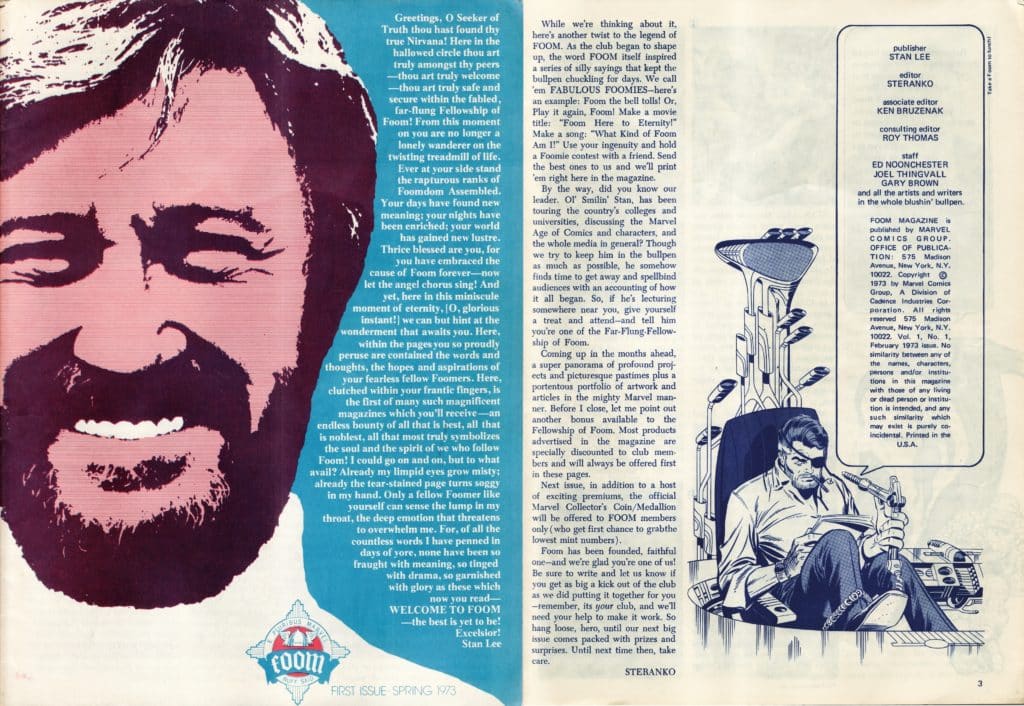
Rick Marschall: Yeah, there you go. Grog was his crazy character in BC, this monster type thing that only yelled grog and would make the mountains shake and everything. Well, it never happened, but we had meetings. We had mock up versions of the magazine. In a baseball way, it was maybe rounded first and halfway to second, but we had meetings, and it could have happened. It would have been fun, but it never did happen. But in any event, from that association and my connection with … because of that, European comics, we would have run a lot of them in there, etc., I got to know Stan from those meetings and from our correspondence and our shared enthusiasms and everything.
Rick Marschall: So when I left the syndication world and was starving, one of the periods of my life when I was starving, I looked up Stan again and applied for a job at Marvel either to revive that magazine idea or to work on some other new projects. I wrote him. I said, “Frankly, I’m not a superhero fan, so maybe you’re thinking of some new …” As it turned out, I was hired to be editor of the magazine line and then eventually Epic and everything, so that’s the way it happened.
Rick Marschall: So he was my connection and how I got the job offer and would up at Marvel. It’s a little different than Shooter’s point of view. My first few weeks, I was actually in Shooter’s office, had a desk there. It was good because I could see how he interacted with people. The first assignment he gave me was he gave me a pile of Chris Claremont’s stories. He said that he was really not pleased with Claremont’s writing. He was too wordy, I don’t know, all this he probably wouldn’t admit to now, but his reservations about Claremont’s work and could I rein him in? Could I edit the next story that comes in?
Rick Marschall: Well, I did and Claremont exploded. He didn’t want anyone to touch his work and basically, the editors’ work at Marvel, I think it’s fair to say, that is before the writers write. It’s putting the teams together. It’s doing a lot of what if and giving direction to a story and all like that. It’s not copy editing at the end of the stage grammar, like I can’t even pitch good, something like that, but what did I know?
Rick Marschall: So Claremont exploded and all like that, and it was not a good start, but then okay, it was just in the magazine division. I got Ralph Macchio as a-
Alex: That was 1978?
Rick Marschall: ’77 or ’78. I cannot-
Alex: ’77 or ’78, okay.
Rick Marschall: I’m sure you guys know better than I do. I got Macchio as an assistant. I heard this way afterward while I was still at Marvel but heard from Shooter that I was the only guy showing up with a jacket and tie in the office. One of his hopes for me was that I would reign in Macchio and some of the crazy guys on the staff and be a little more professional, and he thinks I was just flipped by them, but I was always nuts. I just didn’t look like a nut.
Bill: Sometimes you look like a nut, sometimes you don’t, Rick. I had to go there.
Rick Marschall: Thank you. We set that up, but the whole time I was at Marvel, it was like one big frat party. It was the best … Well, a lot of my jobs have been the best job I had in my life but we had a lot of fun. We did crazy things, practical jokes that would fill an encyclopedia, the third horn encyclopedia, that size, with practical jokes at Marvel.
Jim: That was with your impersonation stuff, right, that you were able to do the voices?
Rick Marschall: That was part of it, but having-
Jim: I love that story
Rick Marschall: I will do that. I probably won’t do the voices because-
Bill: Oh come on.
Rick Marschall: … some people are still alive, but before the tangent gets lost, in spite of all that, maybe because of it, okay, creative ferment, but I am still so proud of a lot of the work I did at Marvel and some of the stuff that was done for the first time and fighting for creator rights, which has also been lost. I mean, I think I have a big role in that. It would have happened anyway, but I fought for it like mad. So I’m proud of a lot of stuff we did, but Ralph and I had this … Ralph, you should have him on sometime because he’s a survivor. He’s shy but if you draw him out … I mean think of how long he was at Marvel and everything, right?
Bill: He was so good in Karate Kid. I always have to say that when I talk about him, sorry.
Rick Marschall: That’s about right. I don’t know if he’s sick of that or not, but he should be.
Jim: I bet he is.
Rick Marschall: I used to tell him that I heard through a mutual friend that the actor from Karate Kid is sick to death of that guy at Marvel because he’s always getting people coming up to him asking him to draw Spidey for him or something.
Rick Marschall: Ralph and I had this office in the middle of the … literally the middle of the city block floor of 575 Madison Avenue, the geographical center, with glass walls on two sides and two doors. We could close the doors and see the parade of humanity walking past. The bullpen was right opposite at one window and the Xerox machines, so when freelancers were in or staffers, we’d see them walking past. We’d see them in the bullpen. We’d see them making 200 copies on the Xerox machine.
Rick Marschall: Because Ralph and I would make comments, or provide their voices, or do funny dialog, or something, it was a riot. I would also draw caricatures of people. I have a little bit of a gift there and it’s kind of suicidal, but Ralph, when he liked them, he’d put them up on his bulletin board. At one point, there were three dozen of them. Tony DeZuniga’s wife and Roger Stern and who did I love drawing? Roger Slifrey and all these people, and what did I care? …
Rick Marschall: Oh, in ’78. Well, we’re almost at that point. Jim, you asked about the voices. I mean there were all sorts of practical jokes we did. I’d love for these to be collected, but one of them was … and god bless the memory of Bill Mantlo and his horrible end, but one day in the office, we saw that Mantlo was in doing Xeroxing and all like this. We didn’t plan this. These things were all spontaneous but I could do Mantlo’s voice pretty well, and okay, so we knew he wasn’t home.
Rick Marschall: Ralph called his apartment, Mantlo’s in the voice of Chris Claremont. He could do Claremont very well. Okay, so we knew Mantlo wasn’t home, so Ralph left a message in the voice of Chris Claremont that was a little bit provocative, or charging him with this. I don’t know. Then later that afternoon, Claremont was in the office and I called him as Bill Mantlo, called his machine and left a message.
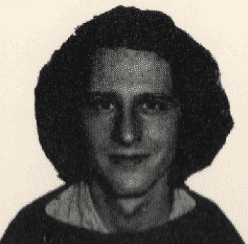
Rick Marschall: Well, the next time they were in the office together, they were pissed at each other. “What you mean by …” whatever it was, “Telling me this or accusing me of that?” “I didn’t call you.” “It’s on my message machine.” “Prove it.” “No, I erased it but don’t do that again.” Well, okay that’s all we need to hear, so we kept doing it and a big feud It went on and on. … They never knew, but anyway, that’s the kind of thing we did.
Jim: That’s just awesome. That makes me so happy.
Alex: I love that.
Rick Marschall: It wasn’t really nice to them, but Peter Ledger, who came from Australia and worked on Weirdworld, he wore out his welcome eventually. When he went to California, to the San Diego convention, well, we got even with him.
Alex: Now, how did Peter Ledger wear out his welcome?
Rick Marschall: Yeah. Okay, well I hesitated at that. He sent some samples when we were cooking up Weirdworld as what it turned into, a three issue deluxe magazine format color. By the way, here’s a mistake I made I wish I could pull back. I’m proud of that series and I think it was okay with Nebres’s inks … Buscema’s pencils, Nebres’s inks and Ledgers’ airbrushing and color effects and everything, but I was too full of myself. I’d never written this but I wanted to be boss of the assembly line in that factory.
Rick Marschall: Now, what do I mean by that? With the full color facilities we had for John to do the pencils and Nebres, who his style I was in love with at that point, I thought we’d go back and forth on it, and it’s going to be the greatest visual thing we could do. Rudy would do some of the foreground figures in black ink. Then it would go back to John maybe doing some other details or Ledger doing backgrounds in water color. Then Nebres would go in with colored inks and do more details, just colored inks and we could get a three dimensional look. Then Ledger would finish it with airbrush effects and everything.
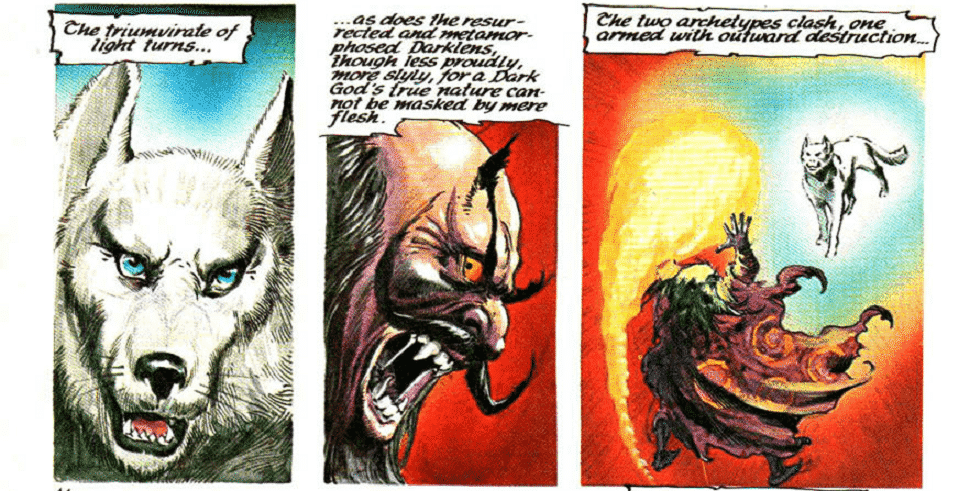
Rick Marschall: Well, a lot of the stuff is too fancy for some good, and John Buscema, who I got to know very well when we went to Europe together, always the nicest, gentlest guy in the world and an awesome talent, he was dying to do everything on that book, pencils, inks, finishes, everything. He gave me samples and he would shower me with sketches and pages and everything. It was wonderful stuff, but I was so fixed on wanting to manage that production line that I said no thanks.
Rick Marschall: That is always a regret because I knew it disappointed him. He did great pencils, and I think overall it would have been a better book and today been like oh, there’s Howard Pyle and there’s John Buscema in that Weirdworld. We’d see it differently today, so I regret that.
Jim: Oh, that’s really interesting. It’s a beautiful book though. I mean I loved that when it … Have you ever seen it, Alex? Do you have that?
Alex: Yeah, the colors are intense, right? I remember Buscema liked it because he wasn’t that crazy about superheroes and wanted to do some fantasy, different stuff.
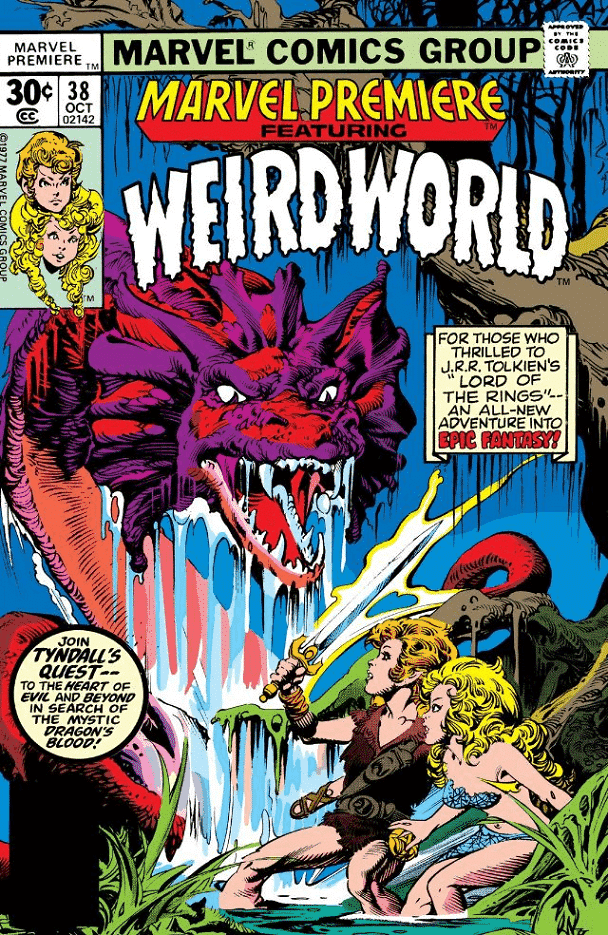
Rick Marschall: Exactly, yeah.
Jim: It was gorgeous by the way. I thought unfairly, it got called Wendy Pini like and I thought that was not the fact, but I don’t think Buscema’s ever looked better. I mean his work on that was absolutely fantastic.
Rick Marschall: Yeah, it really was. Sometimes I dig up his pencils, which I have a lot of copies .
Bill: Oh, I would love to see that.
Alex: Yeah, beautiful.
Rick Marschall: He tried to convince me he could have done it all. He would have but Wendy Pini was riding high at that point, and I think one of the first issues of Epic, I commissioned her to do a story. I think so.
Jim: Yeah, that’s right.
Rick Marschall: But if there was any inspirationl, it was really … You know where that grew out of? Now, Weirdworld had been a black and white comic a few years before. So it existed but the genesis of that color, the three part color series was Lord of the Rings that Bakshi was doing.
Alex: Right, exactly.
Rick Marschall: We tried to get the rights to do a comic book version of that, to have him and his staff draw it or frames from the cartoon or whatever ad then we negotiated with the Tolkien estate. I mean it was a big mess. It never happened, so then we thought or Ralph said …. Because I didn’t know Marvel history, he said, “We had this thing called Weirdworld. It’s kind of the same thing. Let’s just revive that.” Mike Ploog had done the-
Bill: You mean wizards?
Rick Marschall: Pardon me?
Bill: You mean wizards?
Jim: No. he’s talking about Weirdworld.
Bill: Oh, I thought you meant Wizards the movie because Mike Ploog worked with Ralph Bakshi on that. I apologize.
Rick Marschall: No, that’s just a coincidence. No, Ploog had done the black and white comic and very well. Then we talked with him about doing this project and he said yes and then no. It had to do with creators’ rights and we didn’t have them established yet. It put us in quite a hole with the deadline. He had done samples too and they were great.
Rick Marschall: So my only little reference to that creative speed bump was you might see in one of the Weirdworld foldouts … A three page foldout when the characters enter the city and there’s hundred characters doing this and that, buildings at night and emptying chamber pots and all this business. There’s a little monkey in a cage, hard to see. The name of the monkey in a little sign on the cage was Goolp, which is Ploog spelled backwards.
Rick Marschall: Because of just the scheduling of that, I didn’t mind him opting out, but it made it very tough, so that’s a little in joke.
Jim: So Rick, I have a question about that. Later on, it was either in Marvel Spotlight or Marvel Premiere, I don’t remember it. There was a Weirdworld one shot and it was by Ploog. Was that a colorized version of the black and white piece that he’d done earlier? Do you know?
Rick Marschall: I wish I could answer that. I don’t know. I would guess yes.
Jim: I mean I never knew that, but based on what you’re saying, that’d be my guess now. Then Shooter basically ran him … Well, Shooter was responsible for Ploog leaving according to Ploog, I know. I thought he was a major talent.
Rick Marschall: That might have even been before us. I would guess that might have been the colorized version of that but I don’t know that at all. I don’t.
Alex: Now, something I just want to put out there just for the listeners. Some of the magazines that Rick worked on, Tomb of Dracula, Savage Sword of Conan, the color super specials including Kiss, Marvel Preview, Howard the Duck. Tell us about working on those magazines and working with the artists and writers, and how that compared to editing the newspaper stuff.
Rick Marschall: Yeah, good question. I think the step up to Marvel, and I don’t mean necessarily step up in quality or anything but just longer stories. The dynamics of writing longer stories and characters with more investment in their personalities and such was because of my association with Europe, and going over there and bringing back stacks of graphic novels. I became very excited and I even made a couple speeches to my old groups in the newspaper syndication business, the Comics Council and such saying that graphic novels were the way of the future. I mean I was implying that newspaper strips would eventually wither away and die.
Rick Marschall: I was so excited by graphic novels and longer stories. So it was very exciting to me and working on the longer stories. I mean Weirdworld turned out to be three issues, but it was a happy coincidence. The Hulk TV show was riding high, so we did The Hulk magazine eventually.
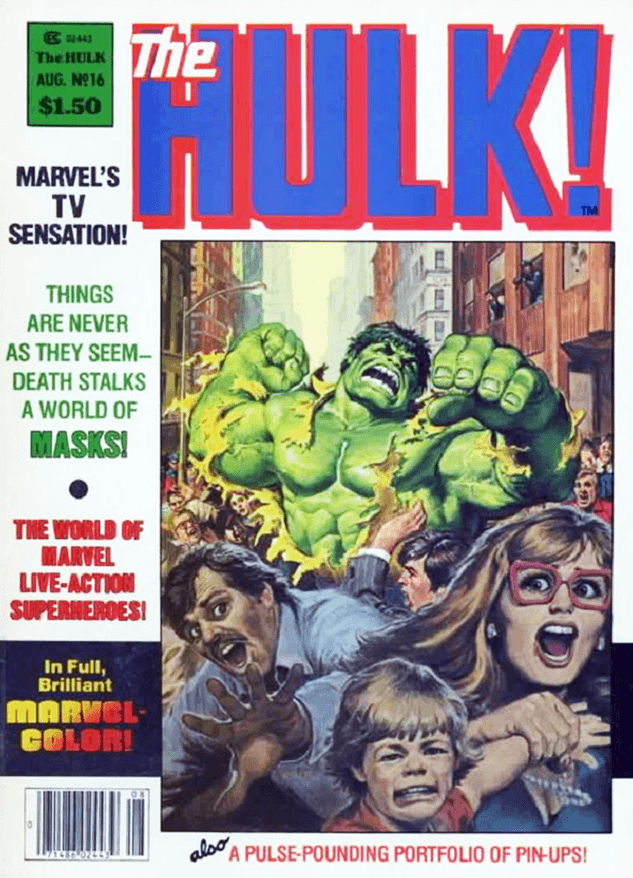
It’s a color magazine and those were longer stories. One thing I was happy to do was Stan and Shooter said these stories in the magazine, The Hulk stories should be a little deeper than the funny book, as Jim used to call them. Maybe everyone calls them that. I don’t know, the full color comics.
Rick Marschall: My go to writer on a lot of these projects was Doug Moench and I liked working with him. He was very responsive and we just did stories, a story about child abuse and some deeper stories that had implications and more subtexts and things. I mean it wasn’t Anton Chekov or anything, but it was the right time for me with my ambitions and sensibilities to get my teeth into longer stories and more mature art.
Alex: Right, because it seems like that’s a difference. A lot of Marvel seems almost childlike in the 80s compared to when you were working on it in the later 70s. It seems like that later 70s stuff, I can appreciate it as a 40 year old reading that stuff.
Rick Marschall: Well, one thing. I didn’t do any favors but I’d be at some of the meetings where the whole staff would be talking … oh editors and assistant editors would be talking about characters and premises and what ifs. Not the title What If, but you know. It wasn’t very smart of me, but I used to talk about mucus man, which is my generic title for silly superheroes, and it was really suicidal. Roger Stern would say, “Let’s have this fight go for six days, six pages.” … I used to talk about all these guys in their pajamas having fights. Let’s really talk … Well, that’s what paid my paychecks, so I mean, it was stupid of me talk about this.
Alex: So one difference between working with these strip guys and the comic book guys is that the comic book guys were essentially fans who could draw and write, and so they really devoted themselves to the Marvel continuity. Then you brought a bit of a more mature strip and editorial perspective to that, so was there pushback? Was there conflict over trying to meld a more adult, humanist perspective with the fans’ superhero artist writer perspective?
Rick Marschall: You know what? There was not partly because I was my own little world. I was given the black and white magazines and the new color projects, so people didn’t really care. That’s one thing. The second thing was Stan specifically told me when I was hired, wouldn’t it be great … In these magazines. He wasn’t talking about the full color books but in these magazines, if I could bring some of my strip friends in to work freelance.
Rick Marschall: So Frank Bolle who did the … What was he doing? The Winnie Winkle strip of all things. Leonard Starr was going to draw something for us. I tried to get Frank Robbins who eventually did do stuff maybe for Marvel, but I think for DC.
Bill: Tons of Marvel stuff.
Rick Marschall: Okay, there we are. I didn’t keep track after I left Marvel because of the bad taste and everything, but I did call a lot of these people in and worked, so it wasn’t all the Marvel people. That was the second aspect. There was a third aspect but I don’t remember it, so …
Alex: Okay, so basically now on the super special with Kiss-
Bill: Were you there for the blood extraction?
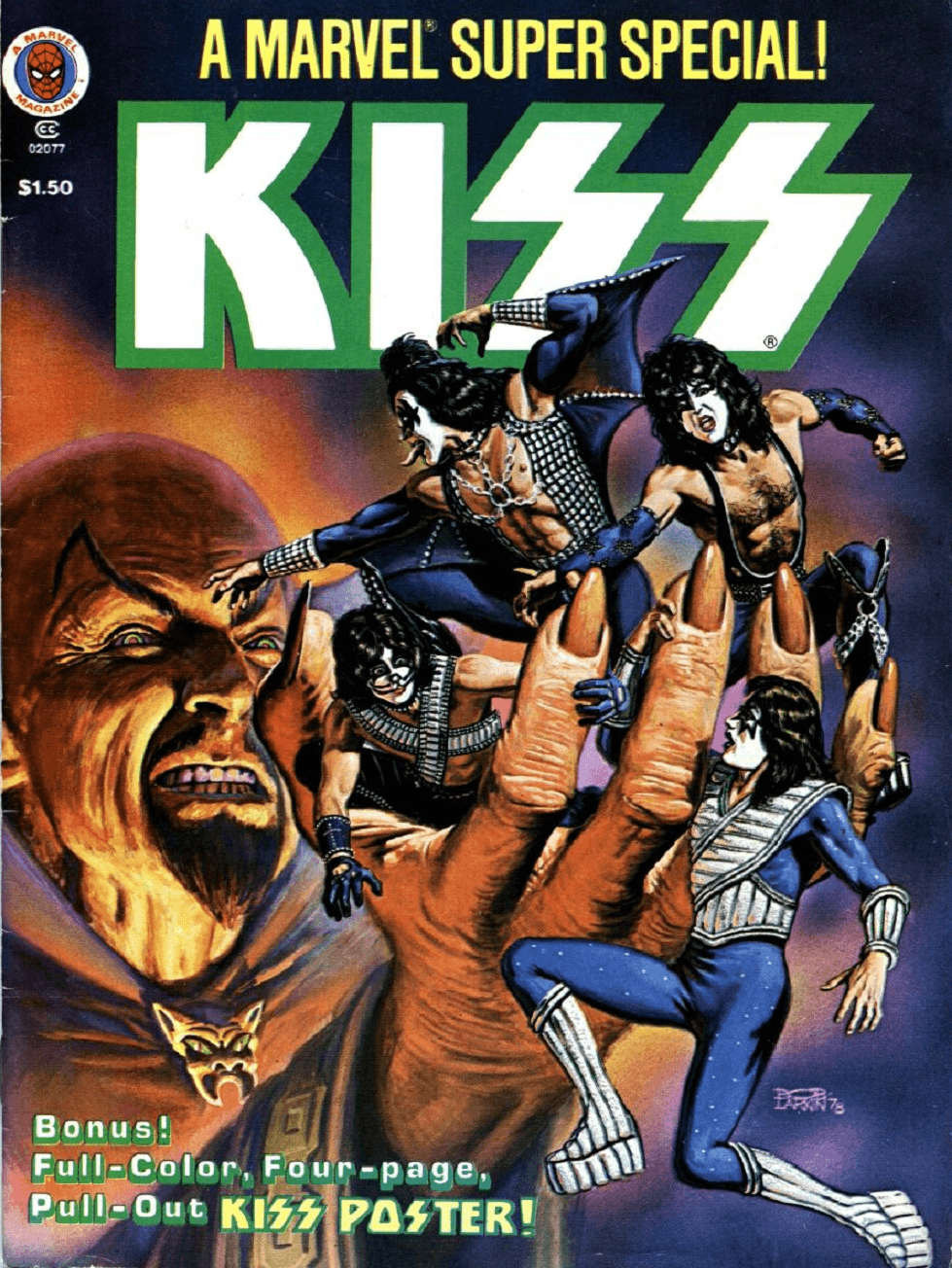
Rick Marschall: Yeah, that’s it. Now we’re really getting specific about Rick as a mature editor and looking for more sophisticated storylines and such, yeah. Well, four bigger idiots I never worked with in my life. I worked on the Kiss title that was not the one where their blood was in the ink supposedly.
Jim: Right, because you came in after the Beatles one, right? Around that time was when you …?
Rick Marschall: Yeah, that’s right.
Jim: So that was after that Kiss.
Advertisement
Rick Marschall: The Beatles one, yeah. I remember that was David Anthony Kraft who had some of the magazines before I was there. It was either the Beatles book or another one where on the first page it said David Anthony Kraft presents whatever, the Beatles or whatever. I remember hearing Stan in his office reaming him out. “You don’t present anything. I present everything.” Only Stan Lee presents.
Alex: Oh wow, that’s amazing.
Bill: Do you do an accurate impersonation? Can you do David Anthony Kraft responding to Stan Lee?
Rick Marschall: Yeah well, I could wet my pants, but this is an audio thing not a video thing, so you wouldn’t …
Rick Marschall: He was rough, but the Kiss book, we treated totally as camp, so that’s why I had Ralph write it. Ralph Macchio wrote it. I don’t think he ever wrote many comics, but that was fun. If you read it, and Ralph would have to tell you and John Romita Junior inked it, some of the visual and half the dialog references there were in jokes, stuff we used to say to us in the office that no one would get beyond a circle of five or seven of us in the Marvel office. I mean the whole thing was a goof.
Rick Marschall: It was a story and a mystery and all this business and I tried to upgrade it. We had a four page foldout, a painting that Bob Larkin did and everything, but that doesn’t fit in with my … I’ll tell you another story. Remember the Moon Knight series?
Jim: Yeah.
Rick Marschall: Well, Moon Knight went on to become a big thing. So is Star Lord, now he’s a defender of-
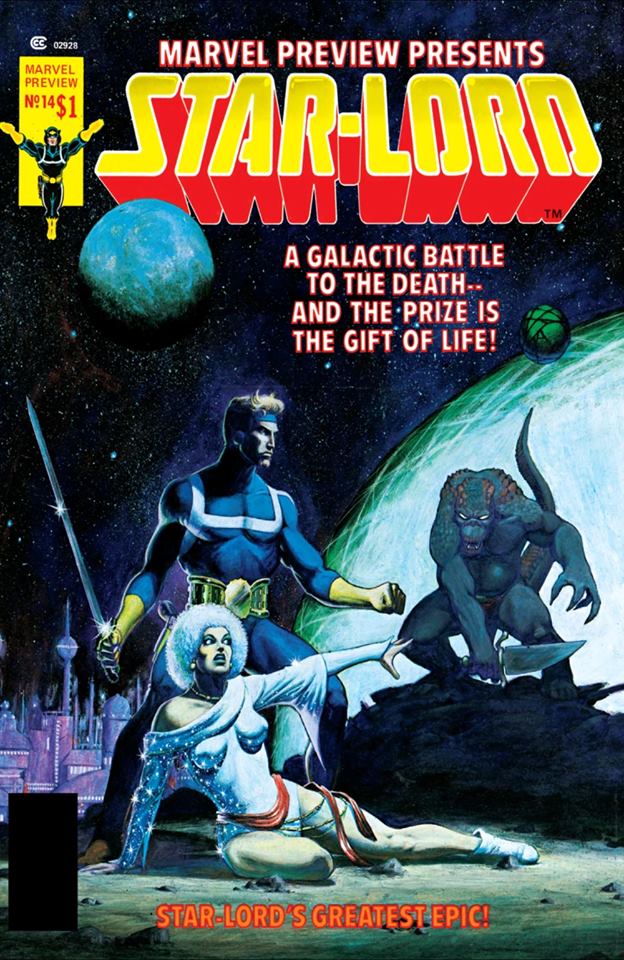
Jim: It’s huge, yeah, The Guardians of the Galaxy.
Rick Marschall: Guardians of the Galaxy, yeah. One thing we did … I asked Ralph since I didn’t know Marvel history. I said, “In the magazine line here, are there any characters who have been established and maybe didn’t get a fair shake? Had a little audience and then they were abandoned that you think we can blow the dust off and revive them?” I was grateful for Ralph and he said, “I always liked Star Lord.” I think Carmine Infantino had done the art on them and Moon Knight was one too.
Rick Marschall: Well, that was the first work that we did it as a backup in the Hulk magazine. Doug wrote a multi chapter story that continued form issue to issue. Bill Sienkiewicz’s first work for us is he came in with a portfolio and I said, “You know what? Neal Adams is going to want this back someday kid, and if he doesn’t, Stan Drake would.” You know Stan Drake’s work? Anyway, it blew me away. That was his first assignment from us at Marvel. It took off and Moon Knight got us on book and all like that.
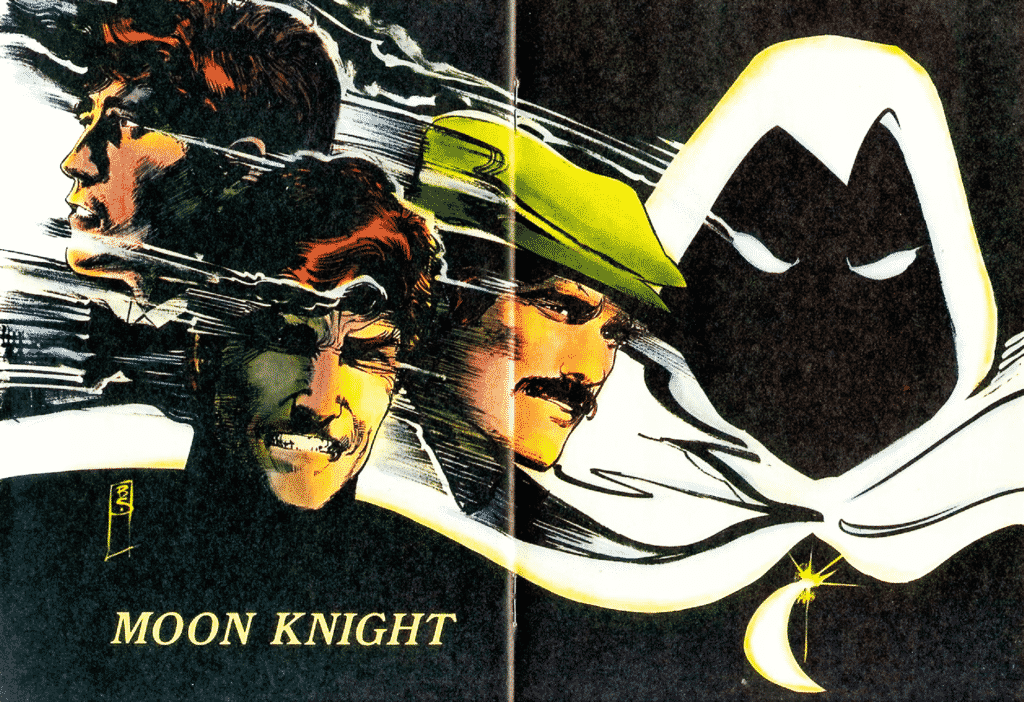
Rick Marschall: Here’s a little insight about Marvel. One of the times I went to Europe on Marvel’s behalf, I went to a publisher I had known from the syndicate. A big publisher in Denmark that had subsidiaries in Germany, in Norway, in Sweden and all the countries, and this editorial staff loved Moon Knight. They said it’s not outright superhero. It’s a costumed hero. No magic powers but like … they kept saying sort of like Carey Grant in To Catch a Thief. Okay, and they loved it so much that they were willing to pay for, commission stories, enough pages that they could do it as a comic there. No overhead to Marvel and then we would get the rights to publish it in the US. They just wanted that character and to have first crack at it internationally.
Rick Marschall: Oh it was a dream. I went back from that trip thinking I had a real feather in my cap. The business office was always nice to me because I had these connections. Shooter was always jealous. “Why are you going to these lunches with European publishers, and why don’t they ask me?” I was dying to say, “Because you’re Thing from the Addams Family. You’re a dork and you don’t understand where Europe is on a map.” “Yeah, but I got …” Anyway, I come back and I tell Stan… tell Stan that … What was the name of the company? Gutenberghaus. That was the name of the group in Denmark. I told him about their love of Moon Knight, and don’t change a thing, do the characters we’re doing it. Don’t change a thing. They just want to be able to commission and do it. They could have invented their own copycat, but they wanted this. They loved Sienkiewicz’s art by the way. Stan, I’m giving this to him on a silver platter and he said … Now this is a warning to you. It’s not a really rude ethnic reference, but it’s what people used to call Swedes when they wanted to be rude but Stan said …
Rick Marschall: I give him this whole presentation, and Stan said, “I’m not going to let any square heads tell me how to do comics,” and he said no to the whole thing. He didn’t want to do it. I mean we had a contract ready to sign. It was amazing.
Alex: Wow.
Rick Marschall: They didn’t want to tell us how to do it. They wanted us to do what we had already started. They just wanted to be first in line to license it. It was crazy.
Alex: So that was an abrupt end to that venture, it sounds like?
Rick Marschall: Yeah. I mean Moon Knight continued of course, so we did license. I mean eventually, they did custom superheroes. Their German subsidiary was more successful with them that their Danish subsidiary, but this was a time in my life where working with European publishers, still going to those conventions, commissioning European artists, I mean it was great.
Alex: …. Okay, so then now the Howard the Duck magazine, Bill Mantlo wrote a sex scene and you edited that book. I’ve seen a couple different versions, the unpublished and published version. What led to deciding one panel versus another on that page?
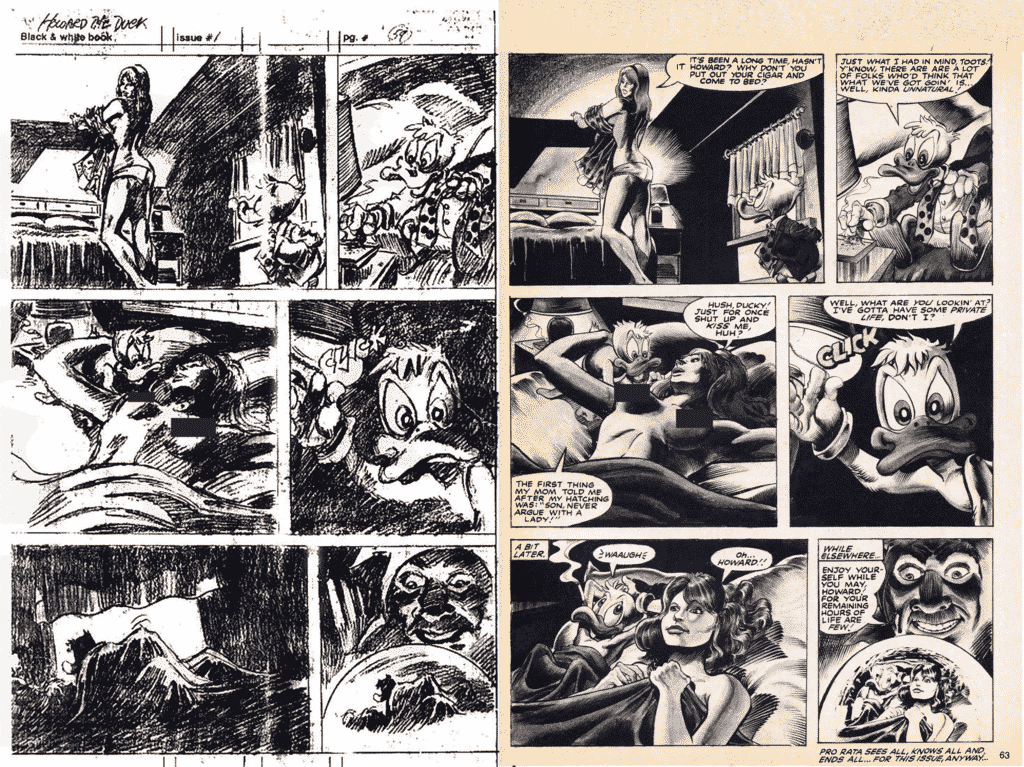
Rick Marschall: Even one of you guys might have posted it. I saw this online a couple months ago with two versions of it, I guess it was, right, as it was published and it was first drawn or something?
Alex: Right, exactly.
Rick Marschall: I barely remember the controversy, but I think I remember being afraid of … There wasn’t a code book but being afraid of pushback. I thought, if I remember this right and I’m willing to admit that I might not remember right, but I think suggesting that we could do a sex reference without showing them humping by either fading to black or whatever, but having Howard smoke a cigarette afterward. That cliché, and I thought that would be a little bit funny as well as making the reference. I think that’s how it was published, but I don’t remember much controversy in the office. I remember sending it around for other editors’ opinions and such, but it was not a big problem or controversy beforehand in the office.
Rick Marschall: I really didn’t like working with Mantlo too much. I thought he could write 80 pages an hour and to me, it sometime showed that way. I know he has a lot of fans, but he was entrenched as a writer of that series. It was just like well, that’s Bill. That sex scene, yeah, I barely remembered it till I saw it online a few months ago.
Alex: Now, I want to go over just some names of people, and to the degree that you’re comfortable, tell us how your experience or your impression of them was when you were working there. Gene Colan, how was working with him?
Rick Marschall: He was just great. Well, that’s all I can say. He was almost always on time. He was almost always pleading poverty, which was fine because I could give him work. I loved Colan and Palmer together. I mean even though it was a horrible story and a crappy reprint licensing, but Jaws two, the artwork, seeing them work together, Colan’s layouts. He was just great to work with and he loved milking me for stories of some of the strip artists I knew.
Alex: Oh wow.
Rick Marschall: But yeah, he was wonderful.
Alex: Now, how about Don McGregor?
Rick Marschall: Well, he was short, right?
Bill: Yes. I guess he still is.
Rick Marschall: He might still be short, yeah. I remember I asked him the first time he came in the office of he were standing in a hole, but yeah, I had not … Anyway, this is stupid. Don was-
Bill: Apologies to Don McGregor.
Rick Marschall: Apologies to Don McGregor, yeah. Being short is one thing I liked about him because I’m short myself. That’s totally stupid to go there, but Don had … I’ve been trying to remember this. I should have prepared better because I figured you would ask about Don. This came in the middle of the transition or the introduction of the creator’s rights contracts. I wanted to ask Ralph or my good friend I still keep in touch with, Elliot Brown before we did this interview if they remembered this, but I know that there was a story published that was Don’s that was not credited to him.
Rick Marschall: Someone wrote me recently that Don is still upset that … I know it was a problem. My memory is that at the very last moment, he withdrew it. We had the script for a while and maybe the complete story. It was like hey, let’s plug it into that issue preview, and then he withdrew it, I think, because he wanted better rates or creator’s rights or something. The company was not willing to do it, so he withdrew it. Then what the heck? How would we do that issue?
Jim: Was this part of the Sherlock Holmes knock off? Was this Hodiah Twist?
Rick Marschall: Yeah, Hodiah Twist, that’s right. I’d forgotten it… I thank you for doing it because I forgot the name of it, but if it appeared with my name as the writer on it … One thing I remember was we were going to run in and I was thinking of pseudonyms to credit it because I guess Marvel owned it or half owned it or whatever, or he had already been paid or something. I was going to put it in as like a wink to the readers saying script, Greg McDonald or some twist on his name. Hey, that’s appropriate, a Hodiah twist on his name, but Greg or McDonald isn’t.
Rick Marschall: Well, I guess we didn’t and I guess my name appeared on it. If that’s so, I remember there were a lot of bad feelings, but Don always has a chip on his shoulder. He was always looking for controversies. Ralph got involved, and he had a history with Don and all like that and so I remember that.
Alex: So that was unintentional on your end?
Rick Marschall: Oh absolutely, yeah. I did write some stuff, not many stories. I mean I wrote the Jaws two adaptation which was so crappy no one else wanted to write it.
Bill: Sounds like the worst movie ever. I can’t imagine being put on that to try to fix it or make it more palatable through comic book eyes. I don’t know.
Rick Marschall: Bill, the only one that was worse was Meteor.
Bill: Oh my god, did you write that too?
Jim: Oh yeah, that was awful.
Rick Marschall: I didn’t. No, I don’t think I wrote that. Bad enough I edited it, but I went to the preview. It was one good thing about working at Marvel. I’d see the preview of Battlestar Galactica before it came out. All the studios were trying to sell us on stuff and I saw that and I thought oh, this would give a headache to an aspirin. I mean it was awful. Well, Shooter didn’t… Shooter didn’t care about it. Stan wanted us to do it, Stan. I went to him and I said, “Stan, this movie is awful. I don’t think in the final weeks they’re going to make it better. What’s the thing?” He said, “Ricko …” He always called me Ricko. He said, “Ricko, I’ll tell you. I got a thing for Natalie Wood.” He had a thing for Natalie Wood.
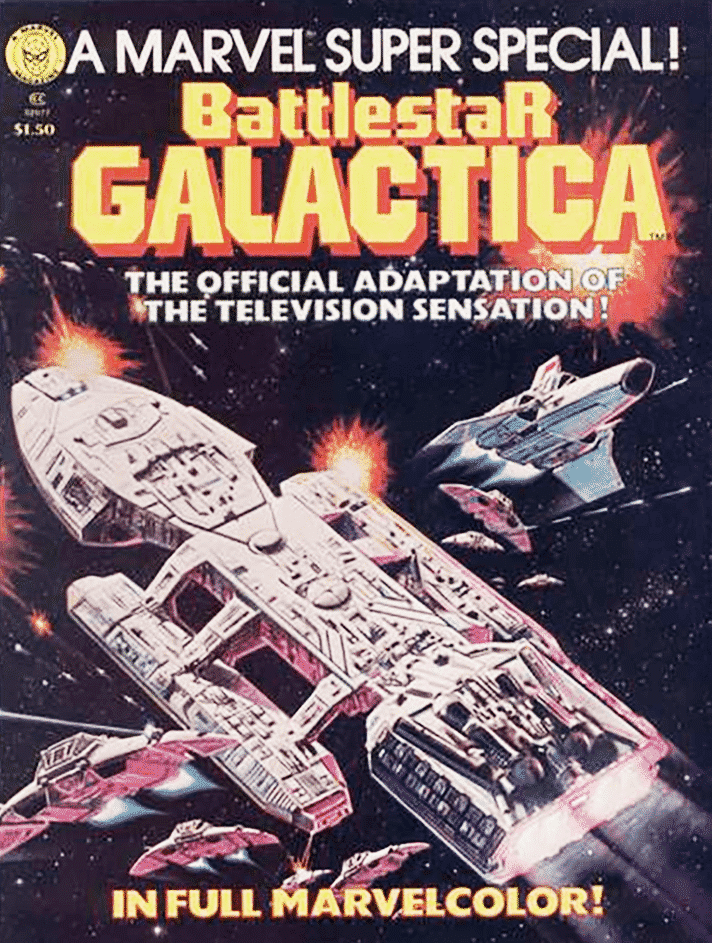
Alex: Oh, that’s amazing.
Rick Marschall: He’s a gem. He’s a real gem. But unfortunately, Robert Wagner wasn’t there on time to save us from that. Anyway, so the movie, I mean-
Bill: Whoa, awful.
Rick Marschall: Now, anyway-
Bill: Christopher Walken is not amused. haha
Rick Marschall: That’s about right. So there were some turkeys and we had to do them, but getting back to Don, I wish I could remember. Ralph will remember probably better than I because he had had a history with Don McGregor, but if you would ask me cold if in fact I was credited as the writer of that, not just the editor of the book, I’d say no. It’s crazy if it happened. I don’t remember those circumstances, but I remember it was a real problem. Don was upset and he had a right to be upset, and I think he had been previously paid, so it wasn’t that I got money that he should have gotten for writing it.
Jim: Alex, just a tiny pushback on what you said about the fan’s that. Also, I mean based upon what … I know what you were saying, but McGregor, what he was doing on Panther’s Rage at that time, he was not just a fan. I mean he was trying to expand that more that I think any … I would say, Rick, more than the other writers there. There were some other interesting ones like Gerber, but McGregor was something very different there and a weird fit for Marvel at the time, I would say.
Bill: Well, McGregor had a huge Burrows flair too and I think that helped it, don’t you?
Jim: A what?
Bill: Edgar Rice Burrows flair.
Jim: Well, nothing to do with Panther at all. No, I wouldn’t say that at all.
Bill: You don’t think so? Okay, got you.
Rick Marschall: Yeah, I don’t know the title you’re talking about or that series, but I do remember when I got along with Don that I thought he had … I didn’t read his stuff that well, but I knew that he had better sensibilities.
Jim: That’s what I’m saying.
Rick Marschall: He was able to talk about other writers and other series and his ambitions were higher. I used to say why don’t you write books, or books in addition, or something like that? There were other writers and artists who I felt had those qualities. Don wasn’t the only one.
Alex: Now, the next name I have is Steve Gerber. Tell us what’s your impression of him or any experience you had with Steve Gerber.
Rick Marschall: That’s easy, not much. I mean I met him, that’s all. I never edited him.
Alex: Because he’s left by that time, right?
Rick Marschall: Yes, sure he had. He had left. He worked on Howard the Duck, right? I mean I’m an idiot… Yeah. No, I never worked with him. He was a name to me. I know that a lot of people on the staff regretted that he left, but I didn’t know. I worked with Marv and Len and they were workman like, and I thought they rose to their levels, but Don was better.
Alex: Tell us your impression of Marv Wolfman and Len Wein.
Rick Marschall: Len Wein, yeah. Well, they were … This is going to sound like backhanded compliments but it’s not. They rose to their level. They were workman like. They were very professional. Their imaginations were great. They were quick studies with artists and storylines and maybe variations of same. So I respected the heck out of them, but a little like Roy Thomas, they were a world unto themselves. Mostly, it didn’t touch their work… and they earned that.
Alex: They earned that. Do you remember working on or editing the Gil Kane Blackmark Marvel magazine reprint?
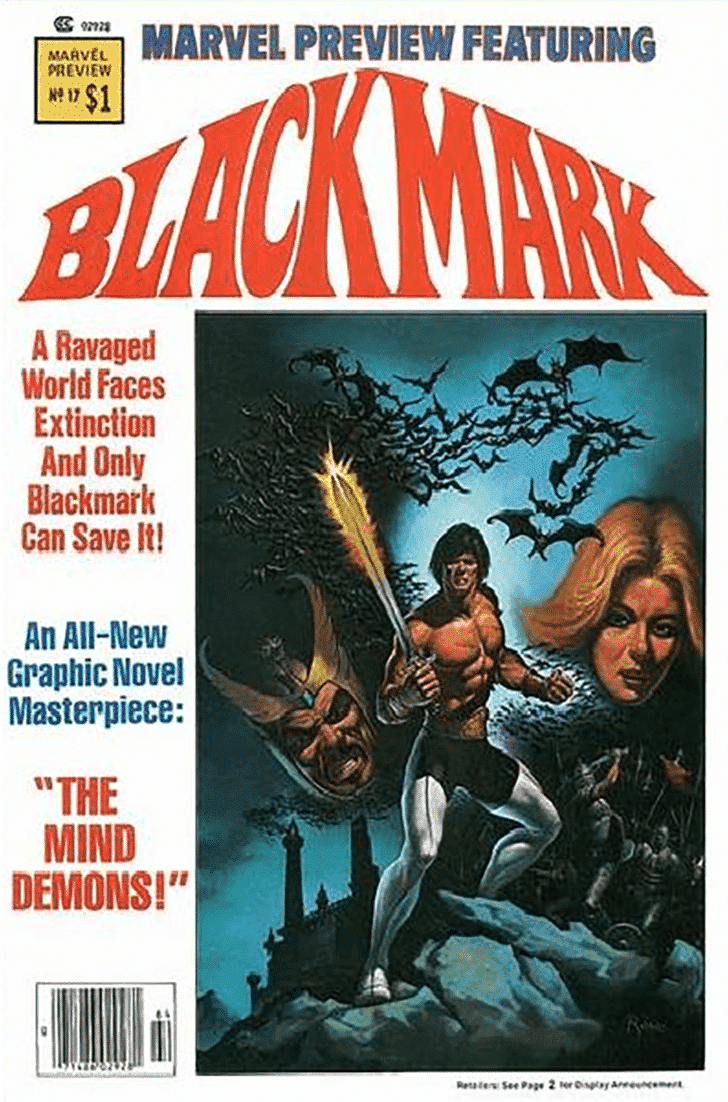
Rick Marschall: Yeah, that might have even been part of the McGregor problem, but there was … I kept the deadlines pretty well, meaning I was usually normally late. Not absurdly late, but we find ourselves in a real bind with Marvel Preview, the black and white line, the book that we had to put together and issue. I don’t know if Gil had told me beforehand or how I knew it. Maybe Ralph knew of it or something, but Gil had done that Blackmark story already. It was already in the can, already done. He had pitched it to Marvel maybe as a paperback or some other format.
Jim: It had been done as a paperback. It was a Signet paperback. It had already been done.
Rick Marschall: So that’s why I remember that. I don’t know how we got away with reformatting it as a comic book, sloppy seconds. We made a quick deal with him to do it in that format. I think Bob Larkin or someone did a painted cover. I don’t think it was Gil’s cover art, but I’d known Gil previously and knew him afterwards and everything up in Connecticut. We were neighbors, but I didn’t have to lift a finger to that. It was all the bullpen just reformatting it.
Alex: How did you like Gil Kane? Tell us about that.
Rick Marschall: Hard boiled… That’s a WC Fields line. He was difficult to work with. He was a difficult, even up in Connecticut, in social situations. Anyway, I never got along really well with him. There were a lot of cartoonists. We would all hang around together, all have lunches and weekend parties and everything, but for instance, he used to think Leonard Starr was anti-Semite and he didn’t like Gil for that reason.
Alex: I see. Oh, okay.
Bill: Did you hear Rick, my boy?
Rick Marschall: There you go.
Bill: My boy, you know, back in the day when I was doing Green Lantern, I just … Sorry. I met him four different times and I got so many Bill, my boys I didn’t know what to do with it, so I just had to say that.
Rick Marschall: Always my boys. I don’t know how tall you are but he was about 6’5” or something like that, so it was- easy for him to look down on people, which he did rhetorically as well as-
Alex: Now, you had mentioned working with Doug Moench. What was about his writing that you liked?
Rick Marschall: A little bit like Marv and Len. Maybe I would have used them more if I could have. By the way, before I forget it, we were talking about the magazine department unto itself and everything and why people were not who we worked with and everything. I tried like heck. I told you Sienkiewicz came with a portfolio and new artists either with a few issues under their belt or coming in with portfolios in that general time that I was there. I tried to get Frank Miller to do direct color magazine work, John Byrne who was hitting his stride then, different people, but they did not want to work for the magazine’s better color, better quality, better formats because they were intent on working on the funny books they grew up with.
Alex: Mm-hmm (affirmative, yes. They was a fan aspect to that, would you say that?
Rick Marschall: And that changed. Yes an aspect, definitely. That changed of course, but it stymied me at the time because I wanted to make stars out of them. I knew they were good. I’m sorry, so it’s a tangent. You just asked about-
Alex: No, that’s okay. That’s good, and then Doug Moench, you enjoyed his … Did you feel it was more of the adult flavor that you liked?
Rick Marschall: Yes, I think so, but he was very easy to work with. The brainstorming sessions I would have with Doug or with Ralph too were just fabulous. He would see things and suggest things. He didn’t have much ego. He could dig in his heels of course, but he was just a wonderful creative person to work with and I appreciated it. They gave me a little grief after a while of saying, “Marschall is doing exciting things at Marvel except maybe he’s relying on one writer more than he should.” Well, I was happy doing that, but that’s probably a good observation.
Alex: Tell us about working with some of the Filipino artists Alfredo Alcala and Tony DeZuniga. Tell us about those guys.
Rick Marschall: They were great. They would take direction. They would turn in pages before you finished telling them what you wanted. They were amazing. Alfredo was someone like some artists like Joe Rubinstein and others who would love to talk about the classic illustrators and such. Never got along that well with Joe, except bullshitting about the great illustrators of the past. Joe knows his stuff.
Rick Marschall: Alfredo used to come into the office to drop off his story or something and he would say, “The great pirate artist, Frank Breinvin from England.” He’d go on and on and Ralph would be laughing in the corner. I know who he was talking about, but what boy, did he know his stuff. He was very good to work with. Ernie Chan was … I mean I have no regrets about him anyway. Rudy Nebres was great. Only funny story, is Tony DeZuniga still alive?
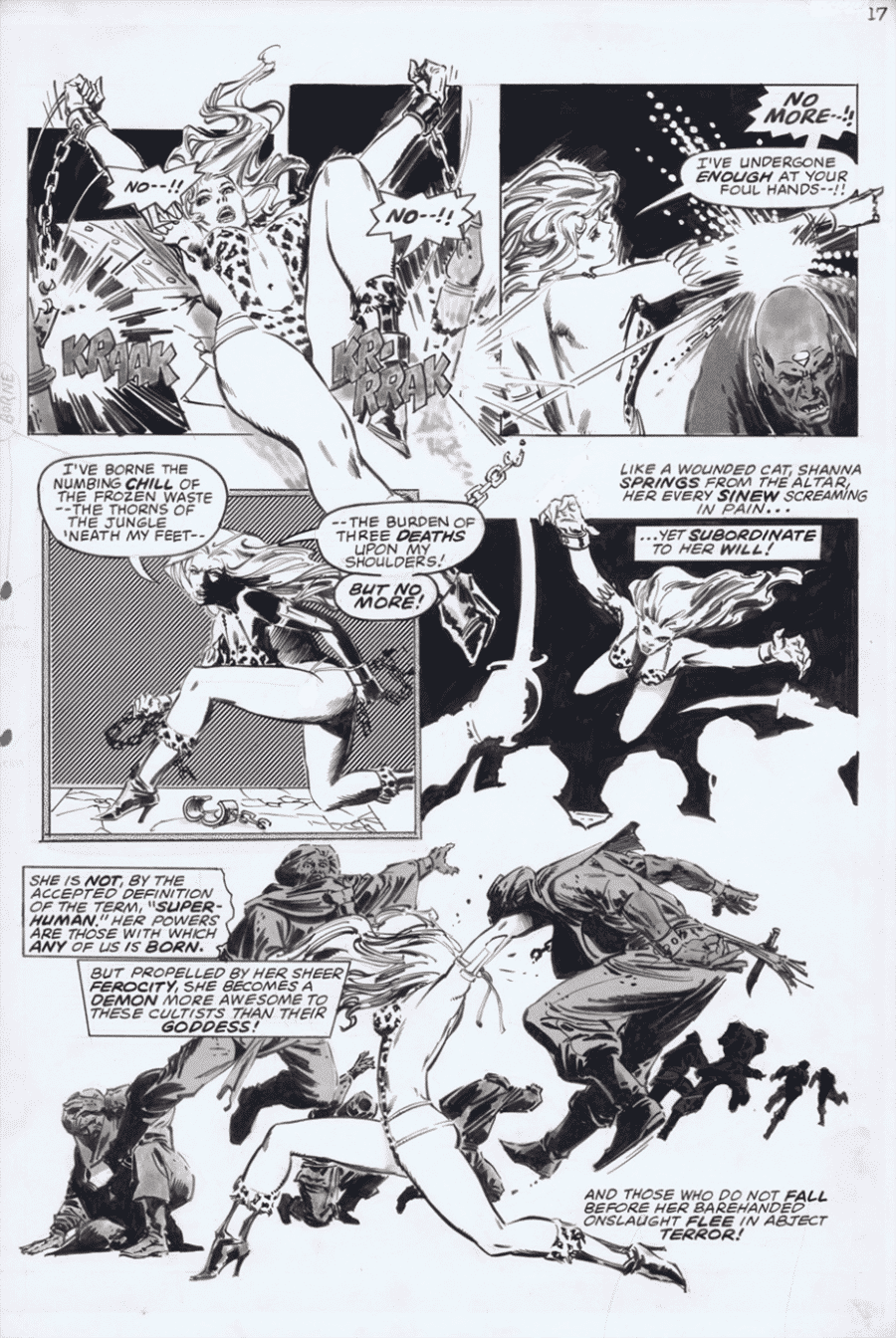
Alex: I’m not sure, but that’s okay. Keep going.
Rick Marschall: Maybe if we do a 10th anniversary tape, I’ll tell that story about Tony. a lot of caricatures of [his wife by] Marie Severin. Marie Severin was great to work with, and she would do caricatures too and we’d trade them and everything. Now, Tony-
Alex: So you and Marie actually bonded on the caricature ability. Is that right?
Advertisement
Rick Marschall: And other things. I told you when I was a kid, I knew John, would visit him in his studio.
Bill: Wow.
Rick Marschall: So I was already in the Severin orbit, but I loved Marie Severin, an artist and a professional and a great sense of humor. We just connected on so many levels. She was an island of sanity in a…
Bill: And a fantastic color sense, right?
Rick Marschall: Oh, absolutely and a great color sense. She understood Stan perfectly on colors. When I was there, Stan had withdrawn. When he did convention appearances, he did not want to field questions. He didn’t know the changes or the new characters or the new powers. He didn’t, so he would just do autographs and such. At that point in the office, he was not in any of the creative sessions or new series, new titles or anything. Shooter would talk to him, but it was really … All Stan would do, and it’s very important, but he would just okay all the covers. Every cover, Stan would okay, and it was a gift he had in there.
Rick Marschall: It really was a privilege and something I never knew from my other background or instincts or experience at the syndicates. Stan has a genius for, I mean, we could call it marketing more than any, whatever, to look at a cover and what words to bounce and what colors to have and relative size and color combination. Marie understood all that, and it was, I think, from years of Stan’s training, but oh, what a sense he had for that. Also page construction which I could have used to better effect at the syndicates, about where to place balloons and sound effects to lead the reader’s eye through pages.
Rick Marschall: I hope no one tries to take those gifts away from Stan. I know a lot of people carp at him, but there was no one better in my experience in those type, basic comics 101 stuff, right? He was great at that.
Alex: Absolutely…. So now, Rick, I want to ask you also, the Earl Norem covers. Tell us about working with Earl Norem and the covers for a lot of those magazines.
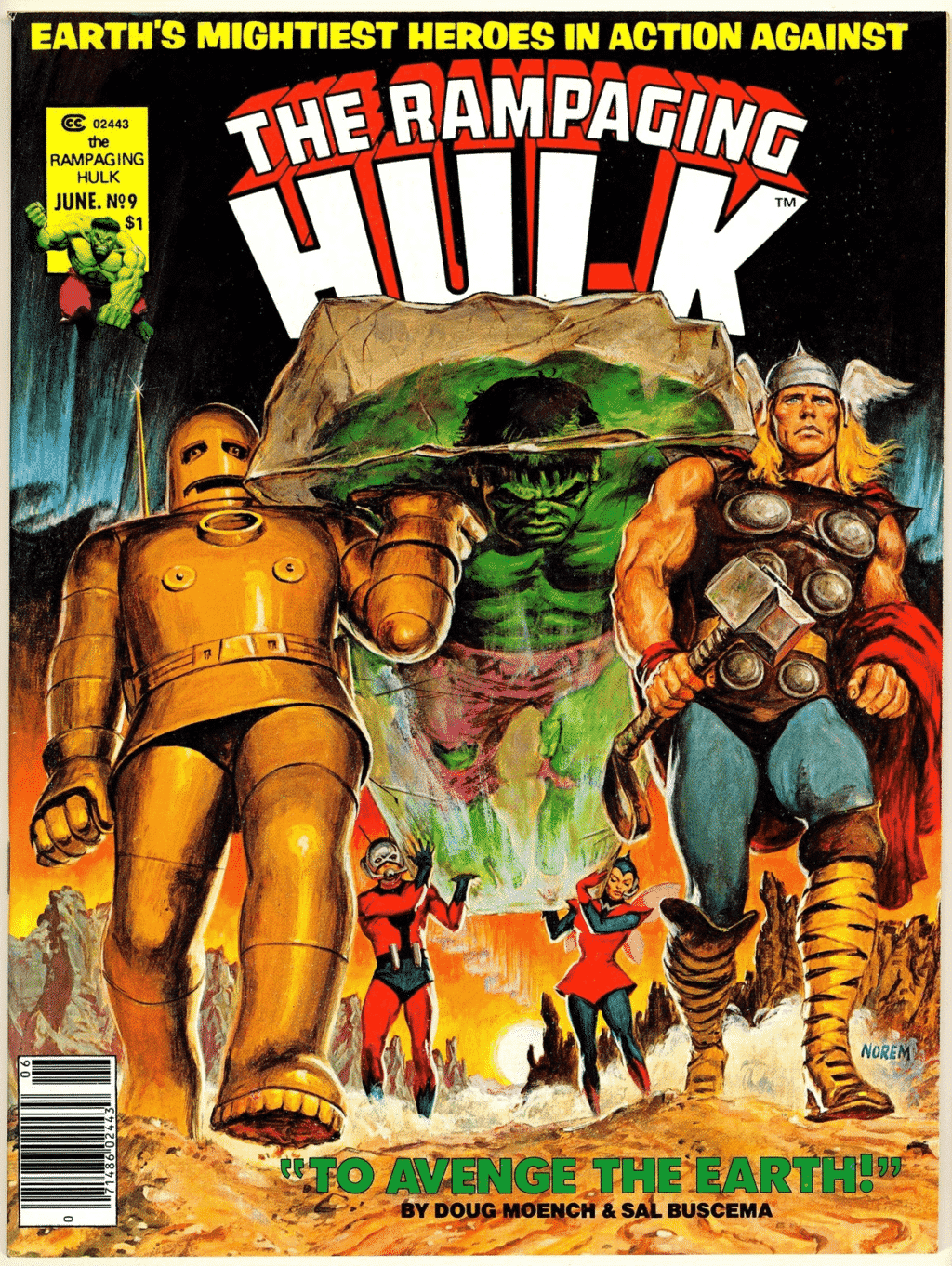
Rick Marschall: He was also one of my go to guys because he was professional from working on the paperbacks and men’s magazines and everything. He never pushed back. He’d never insert himself too much. He would always do … He was the nicest. He could be your neighbor in the neighborhood except he was effin great. No, not great, just thoroughly professional, would do what you asked and not flashy, but he checked all the boxes. Step above him in my preference was Bob Larkin, of the cover artists there, so they’d just be my go to guys really.
Alex: So would you essentially call one of them and say, “Hey, I need a cover for this comic.” Is that how it would work?
Rick Marschall: Yes. I’ll tell you what, usually, Ralph and I would have a talk with the writers. I would do thumbnails because I had art direction in my past and I was a cartoonist. I would do thumbnails. Then I’d take them to Marie and she would do better thumbnails, logo placements, stuff like that. Then the artists would come in and we’d talk about everything from deadlines to … whatever.
Alex: So Earl Norem essentially had layouts to go off of and so did Bob Larkin, and then they would paint their stuff and bring it back to you, is that correct?
Rick Marschall: Exactly.
Alex: Wow. Okay, so the last three names I want to go over, and this starts winding down towards the end of Marvel, but it’s okay to talk about your first interactions toward the end of each name. So tell me about your impression of Archie Goodwin.
Rick Marschall: Yeah, Archie and I sort of overlapped a bit because he had worked in newspaper strips. He was still writing Secret Agent Corrigan and knew some of the people in syndication and everything. So we had a lot of mutual friends, but most of my time at Marvel, he would just drop in occasionally. We would small talk about the strip business or mutual friends. When I got bounced from Epic, he was hired to do that, so we had some interaction. I know he felt uncomfortable about that situation and I did. It was not that he was gunning for that job, but I think he was right for it.
Rick Marschall: I mean that’s all I can tell you about him. He was a very good strip writer. He could have stayed in that all his life, but he was so shy and self-effacing. It was hard to have any other impression of Archie. Well, I-
Alex: He was more of a quiet guy?
Rick Marschall: Definitely, very quiet very shy always.
Bill: Come on, Ricky. You can do i[an impression]
Rick Marschall: Ledger I’ll do some day but very quickly finish that story. He got to be a pain in the ass at the end of the third Weirdworld book because he was always asking for advances. He stopped renting a hotel or something, and he wanted to sleep and did sleep in the Marvel offices, which was against the building codes.
Alex: Oh, wow.
Rick Marschall: Art dealers were calling me because he was double dealing his artwork. He was getting advances and promised to sell pages to Stu Reese and someone else. He was cheating art dealers, and what used to be charming about him got to be uncomfortable. He used to walk around naked, just in his tighty briefs. He used to like to play the Aboriginal man or something. He took a lot of pills like crazy, and you could tell when he was coming down the hall because the garlic … So we just ran out of patience with him.
Rick Marschall: I brought him to the very first San Diego Con that Marvel ever went to. Before then, it was just dealers, comic book dealers and their boxes selling old issues. No company had ever set up there before, and I suggested we do that, and it was just so fans could see Weirdworld being produced. The artists came out and Ledger did with his airbrush. He ate that up and everything. Well, this goes with practical jokes. We were so sick of Ledger at that point that we finagled ourselves into his … I shouldn’t be proud of this. I’m not proud of it. Yes, I am. We got into his hotel room. He took about 80 vitamins a day, and we mixed them all up, all the different jars and put water in some and all this business, unscrewed the handles on all the dressers in the hotel room and everything.
Bill: And sadly, he died the next day. No, I’m just …
Rick Marschall: Well, no he did die in an ugly way, but from that, he claimed to us it was, “Oh, the maids. Maids all want me to screw them and I won’t do it, so they’re out to get me, mate.” Blame the maids. Ralph and Elliott and everyone came, and he’d come down to breakfast and he’d say, “I’m hungry, mate. I should order three breakfasts. I’ve just done 12,000 pushups.” I said, “Wait a minute. Let’s do that arithmetic.” He would have had to be doing pushups for a week. That was Ledger, always over the top and everything, so some of the practical jokes we …
Alex: Now, Stan Lee, he wanted you to bring in some European influences to some of his magazines and add some respectability to the Marvel magazine line.
Rick Marschall: Yeah.
Alex: Was his goal to just take Jim Warren’s magazines off of the shelves? Was that essentially the goal with those magazines? After that, tell us about just working with him toward the end of your stay at Marvel, about Stan Lee specifically.
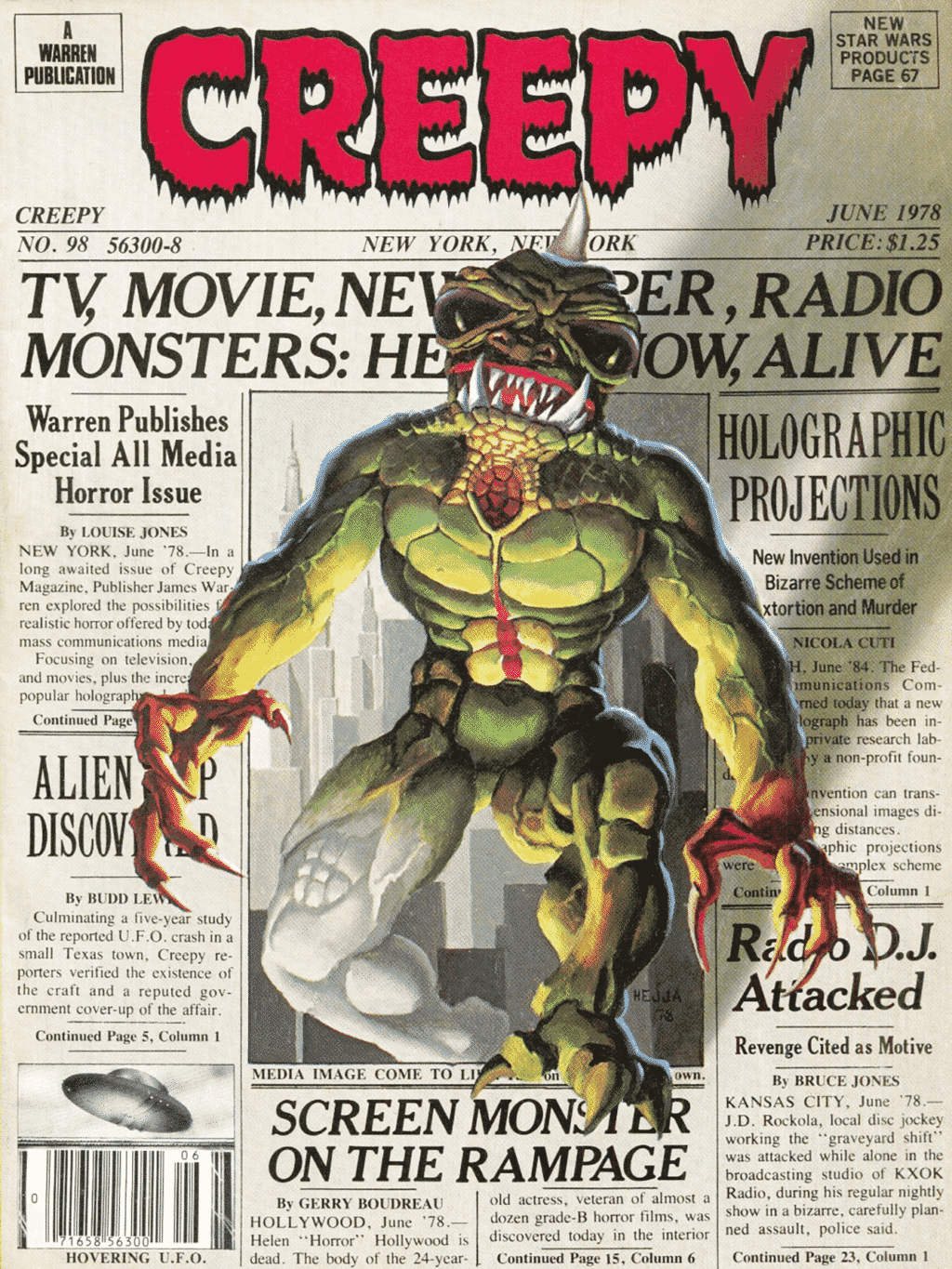
Rick Marschall: That’s a great question. I don’t think that’s the case because I never heard Jim Warren disparaged. I think the black and white line was really a vestige from the Goodmans and when Stan worked for his uncles. So it was never that, and I never even did hear when epic started up, “Ricko, I want you to beat Heavy Metal at their game.” No, it was never a part of it either.
Rick Marschall: So neither Warren on the downside or Heavy Metal lampoon on the upside were ever a consideration in any of that work that I was told of it, was directed.
Alex: So it was more of a vestige of the Goodman magazine management company …
Rick Marschall: I think so.
Alex: Now, how about how was working with Stan during your few years there?
Rick Marschall: It was just great. It was. He was seldom there because he was establishing his Los Angeles residency. He had a big place there where he used to tool around on roller skates, if you can picture that. He totally… totally bought into that. So when we would work together, it would really be in the things I’ve described to you, either the covers or some general direction of things. One thing I know it used to cheese some of the people was that … I got a kick out of it but I didn’t know how special it was until it happened. Stan would often come in to my office instead of calling me to his and sit in front of desk and sometimes just BS about everything in general, about strips or how when he did newspaper strips, he was always frustrated. He was never very successful at that. You know Willie Lumpkin and stuff like that?
Alex: Yeah, right.
Rick Marschall: One time, he told me, I thought that this was revealing, that his … I’ll tell you what? Maybe he said this a thousand times, maybe never, but one time, he told me that his real, overarching, when all is said and done dream for the Marvel empire was to do what Disney did with Disneyland. That it’s become such a part of the culture that it’s not just a kid’s favorite comic book, but his first instinct to dream or to act or to repeat or to live or draw or whatever it was, to think of Marvel, Marvel. The Disney empire was his goal.
Alex: Interesting.
Rick Marschall: How ironic it was that it’s no longer with Marvel. It was bounced 20 times and then Disney bought Marvel and all like that, but I always remembered that. Disney was like an obsession with him. He told me a few times.
Alex: Did he essentially want to be the Walt Disney of Marvel Comics?
Rick Marschall: Yeah, that would have been it. Sure.
Alex: That would have been it.
Rick Marschall: That explains the Stan Lee presents and all like that, sure.
Bill: Right.
Alex: Now, I guess the final name, and then this comes down to what happened with founding Epic. Tell us about from front to back, working with Jim Shooter.
Rick Marschall: He mostly left me alone in that division. I mean at one time, I wrote in an open profile I did of him, I drew a caricature of him just from the nipples to the knees implying that he was too tall to get into one drawing. But I called him the most supportive editor, the most supportive boss and editor I ever had or something like that. It was mostly because he left me alone. He didn’t second guess. He didn’t ask to have scripts run past him or teams or cover designs or anything. If I had questions, I’d got to him, but it was Ralph and everyone in between who really told me what was going on at Marvel.
Rick Marschall: I’m telling you, when I was there, I was a dope about the Marvel universe. I was. The Grimm Brothers, is that Right? Are they characters?
Alex: Oh, the Brothers Grimm, yeah. I know who you’re talking about, those two guys with the skull masks. Okay.
Rick Marschall: There you go. In innocence, I said, “Oh, you mean like the guys who wrote the fairytales?” Well, I mean it was obvious that’s how they got their names. I mean I was so naïve about a lot of the characters and powers and costumes and things. It was stupid, but I had this little empire and Jim left me alone in it. I mean he would talk to me about deadlines and budgets, and I would go to him if I needed him, but until the two things, starting Epic all by itself and then being bounced from Epic, it was just very arbitrary.
Rick Marschall: I don’t think his people skills are great. He didn’t tell me in either case what was coming, what might have been wrong, if anything was wrong, or what a great opportunity that Epic was instead of the magazines. It was just like … Both things were very sudden and not good management.
Alex: Not good management. So did Shooter take you off of Epic? Is that what happened?
Rick Marschall: Yeah.
Alex: Was that from any management or direction from Jim Galton and those guys, or was that just him?
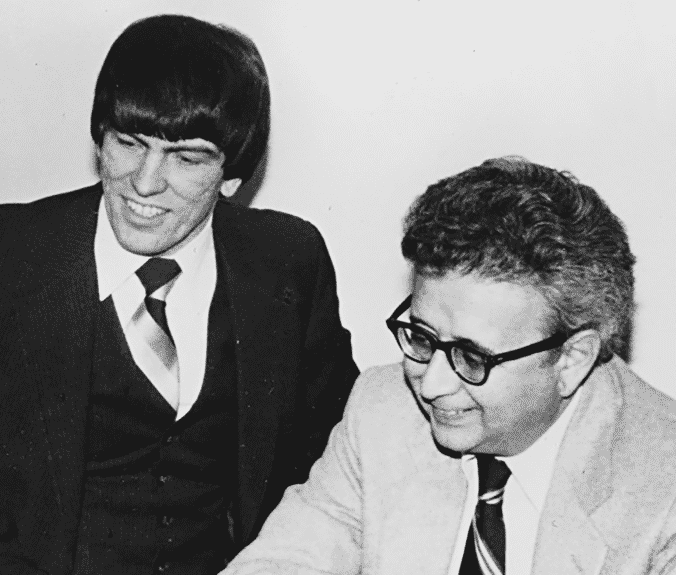
Rick Marschall: Probably Jim Galton. I always had friction with him over budgets. I can’t blame anyone for that. I was waiting outside his office one day. A meeting was ending and he came out finishing a sentence. He was saying, “That guy, Marschall …” I couldn’t do an impression of him but-
Bill: Too late.
Rick Marschall: I wouldn’t know what a budget was like if it bit me, and he was probably right about that.
Bill: Let’s do the Galton. I’m sorry, just saying that.
Alex: Just for the listeners, Galton was the CEO if Cadence or was in the corporate management of Cadence overseeing the comics line, and a lot of what Jim Shooter did came from orders from him. Is that correct?
Rick Marschall: Yeah, I guess so. In any event, Stan never said it was from him, and Galton was the president. He’d come over from Hudson Drug and Cadence Industries. He’s not of a comics background but a business background. So it was arbitrary but when … For instance, we came back from San Diego. All of us had gone out to that convention. When I came back, Lynn Graham, who I think had been Archie Godwin’s girlfriend in the past or something like that. She was not only at the offices but in my desk as the editor of the magazines and black and white line. I’d never met her before, didn’t know they were contemplating a change. That’s when Jim told me, “No, you’re going to do Epic Illustrated now.” Well, it wasn’t Epic at that point. Maybe it was but anyway, I would just do Epic. That’s not good management. I mean it wasn’t like, “Thank you for doing this. Now we’re going to pass it on to someone else. Please help her.” I did help her. She was a very nice person, but yeah, it was very awkward.
Alex: You felt disappointed.
Rick Marschall: Believe me, I was happy to concentrate on Epic. I really was, but I just felt slighted that I wasn’t on it, wasn’t told that I was going to stop with the magazines. I had some storylines going. I had relationships with artists. It was just crappy management, that’s all. It wasn’t-
Bill: If only Twitter had existed then. You would have been tweeted.
Rick Marschall: Yeah, a lot of that is true and could have been done better. Well, it was needless anyway that it happened that way. By the way, if I can say, there are stories that I see on the internet and Wikipedia and everything about the name of Epic. That it was originally planned as odyssey or something like that. That was never the case. We floated 20, 30 names around. Marie Severin came up with different logos for different titles and one of them was Odyssey or Odyssey Illustrated or something like that. It was never on the fast track.

Rick Marschall: I mean that history is not major, but the only thing Stan wanted was to have a title that was small enough and letters large enough that he liked this trick of having some of it transparent and that you could see the background element of a drawing or painting sneak through it. He just thought that was- that’s the type of thing that floated his boat. That’s how it got that logo and title.
Alex: Okay, Jim Shooter told you okay, you’re not going to work on Epic anymore. You’re going to be gone? What happened there?
Rick Marschall: Well Alex, Jim said something to me that, in my mind, made it absolutely impossible for me to work another day there.
Alex: Okay, what was that?
Rick Marschall: You’re fired.
Bill: That’ll do it.
Rick Marschall: It’s an old joke, come on. That’s right. He called me. My wife used to say it was like the Nazis coming in the middle of the night knocking the door down. He called me on a Friday night at home, didn’t come into my office, didn’t ask for a one on one or anything and just said, “You’re finished.” So that was it and I had commissioned a lot of stuff. The first two, three, four issues was stuff that was either in the drawer or ready or I had commissioned and started, but it was a combination of things. He never told me exactly why I was bounced, but it was an immediate fait accompli. I mean I was not my own boss, but Archie was engaged right away and it was in a week, I had to leave.
Rick Marschall: I know he was somewhat … This sounds awful to claim because I hate when I hear people say this, but there was a little bit of jealousy or resentment. Because I remember making the argument in trying to push back on the firing, “Jim, I don’t want your job. Don’t think I want to climb any higher than this if I’m still alive in 40 years.” … I remember making the argument to Jim, “I have no ambitions. You shouldn’t be …” I did his voice before. I know he was bothered by the fact that Alice Donenfeld and people from upstairs, the marketing department, licensing, they’d invite me to lunch when people came in from Europe and publishers because I spoke their language. I was maybe a little more sophisticated than Shooter. I didn’t do it. I wasn’t seeking that. I was very happy in my little world, so that might have been part of it. Maybe budgets but we had Frazetta on the first cover and we had … We were signing up some good people.
Alex: You signed Frazetta on that first cover?
Rick Marschall: Yes.
Bill: How expensive was that?
Rick Marschall: Gee, I can’t tell you at al. I don’t remember.
Bill: Do you remember it being a lot or not a lot? I’m just curious.
Rick Marschall: Yeah, I was surprised at how little it was. I negotiated with his wife, Ellie. It was a painting he had already done and it was not published yet, so I think that’s one thing that enabled us to get it relatively reasonably, but I surely do not remember how much it cost at all.
Bill: It was beautiful. That was a great choice on your part too.
Rick Marschall: Well-
Alex: …what has Jim Shooter claimed about you that you feel is untrue?
Rick Marschall: Well, the first thing was my hiring, because that was through Stan. He might not remember that Stan recommended me and everything, so that diminished me a bit. The other thing was I mean, I’ve just read several things about being difficult to work with. I might be difficult to do an interview with, but I’m not difficult to work with.
Alex: No, you’re great.
Bill: Yeah, you’re a horrible man. You’re so easy to interview. It’s criminal.
Rick Marschall: Thank you. I think I’m easy to work with too. I know I am creatively because I don’t have always the best ideas in the world and I love the act of brainstorming and all like that. It might have been budgets. It might have been a rivalry thing, but listen, when I was bounced, two things I can tell you. One is I went to Stan and I said maybe Epic can be even more independent because I’d like to keep working and why be under Shooter? Maybe I could, and then Stan said something that’s, once again talking about management theory, very smart. He said, “Ricko, I’ve hired Jim to run the shop and I can’t contradict him. I have to support what he does.” A bunch of people interviewed me when I left Marvel, Fan Press and others. One of them was a New York Times reporter. I found this article recently, but Dick Brown that did Hagar the Horrible called me one Saturday morning a few weeks after I got bounced. He said, “You’re in the newspaper of record.” “What are you talking about?” Well, the front page of the New York Times business section had an article called, “Superhero Creators Wrangle.” They had a staff artist draw a comic strip panel of an editor down shot, an editor breaking his pencil in anger at the desk and everything. It was an article about my firing.

Rick Marschall: This is very strange, but it was also about other people. I think this has been a little bit lost in history, but yes, I got bounced and there were those problems and all that, but at the same time, Marv Wolfman, a couple writers got fired. Contracts ended and a couple creators quit in protest. It was a real cauldron under Shooter at that time. Now, for some darn reason, I was the most visible. The Comics Journal made a big deal out of it, but it was other writers and artists at the time too. So it’s like me and the Epic thing were a microcosm of what was going on those few months. Now, Shooter finally established order again. He stayed, I guess a few more years. I wanted to get that in.
Alex: So then would you say … I’m sorry. So that exodus of writers and creators, would you say you were part of that current of people that just left under Shooter? Would you say you were part of that current?
Rick Marschall: Yeah, it was all at the same time, and I’d forgotten that till I read that article, but yeah, they quoted Marv Wolfman too about the surprise he got and some other writers about they couldn’t work there any longer and all that sort of stuff.
Alex: So it was a culling at the time. So then last question, some fans want to know, in the Comics Journal, there was a caricature. Almost looked like a political cartoon caricature of Stan Lee, Jim Shooter, Jim Galton and there behind, Roy Thomas who’s bending over with three knives in his back, and Jim shooter says, “Say hi to Rock for us.” Then it’s signed 1980, Red Meat. Do you know anything about that picture?
Rick Marschall: No, it’s not at all familiar to me I don’t think I’ve ever … We have visual memories, right? I don’t ever remember trying to caricature Stan, certainly not Galton although he looked like Gene Wilder. But I believe that would have been- I think Red Meat was Gary Kwapisz or Fujitaki or someone else who drew for them.
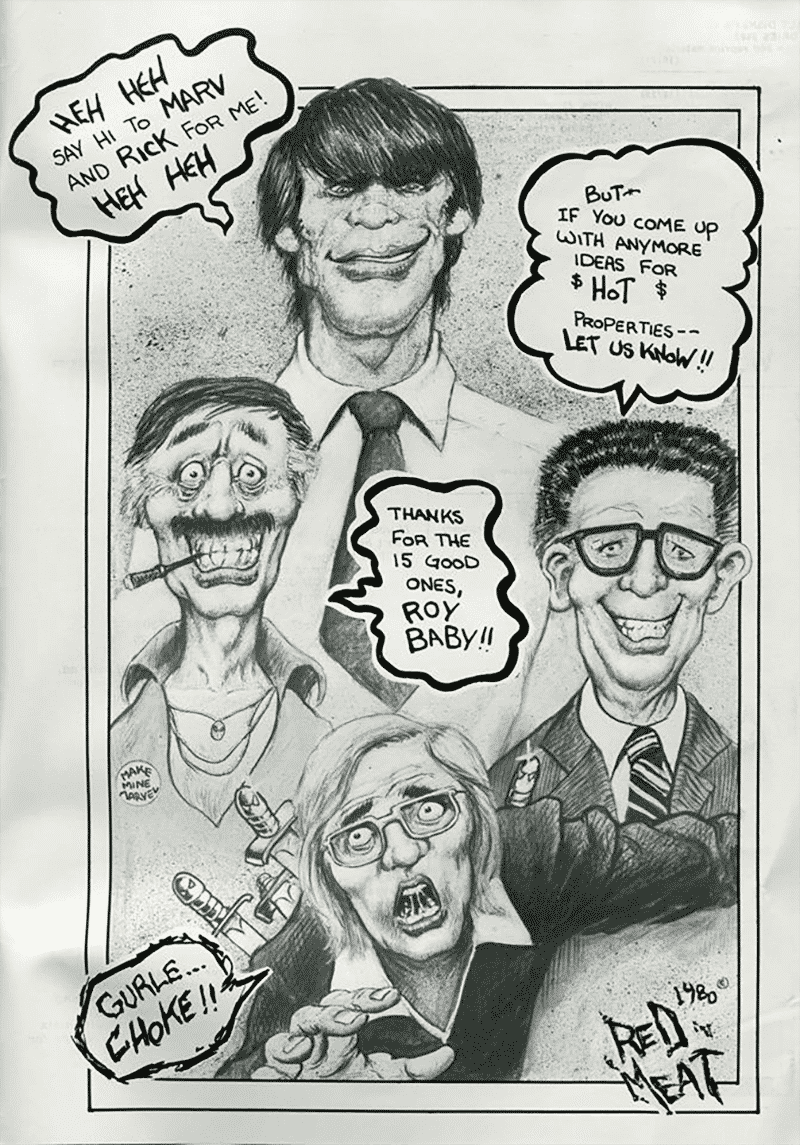
Advertisement
Alex: Oh, okay.
Rick Marschall: It would not have been me. Say hi to Rick, the reference would have been me, but that would not … I wound up doing cartoons for the Comics Journal when Mike Fleischer, who just died, was sowing the journal. Harlan Ellison, that multimillion dollar lawsuit in Lower Manhattan, I would go to the courthouse with-
Bill: There you are.
Rick Marschall: There we are. That’s an issue where he slammed me. We wound up becoming great friends by the way, Harlan and me, but at that time, he took me to task over some political thing. But I did courtroom sketches like you see on TV of Shooter on the stand and Groth on the stand and all this stuff, and I loved it. They ran them as courtroom sketches. What’s that?
Jim: That’s the one I was telling you about Alex.
Rick Marschall: Yeah, I was actually in the courtroom. I’d draw the judge, everyone.
Jim: Well, I was telling Alex about this yesterday-
Alex: Yeah, he brought that up last night.
Jim: … because it was reprinted in a Fantagraphics book within the last decade or so.
Alex: Rick, anytime you want, anytime you feel comfortable, if you could ever post that, those pictures and you talking about it on the Comic Book Historian Group, that would be pretty awesome.
Bill: We love it.
Rick Marschall: Okay. Yeah
Jim: You’re leading me right to what my question was, which was you gave an interview to Gary Groth in 1979 at Marvel or were you definitely out at that point?
Rick Marschall: I was out, and it was recent enough that Gary Groth, who always, like a shark, tastes blood in the water. That’s why he wanted to do a major length and cover story interview with me. Not for any other reason but that he knew he’d get me at a time where I’d say some things I regretted, and I probably did in that interview.
© 2020 Comic Book Historians
